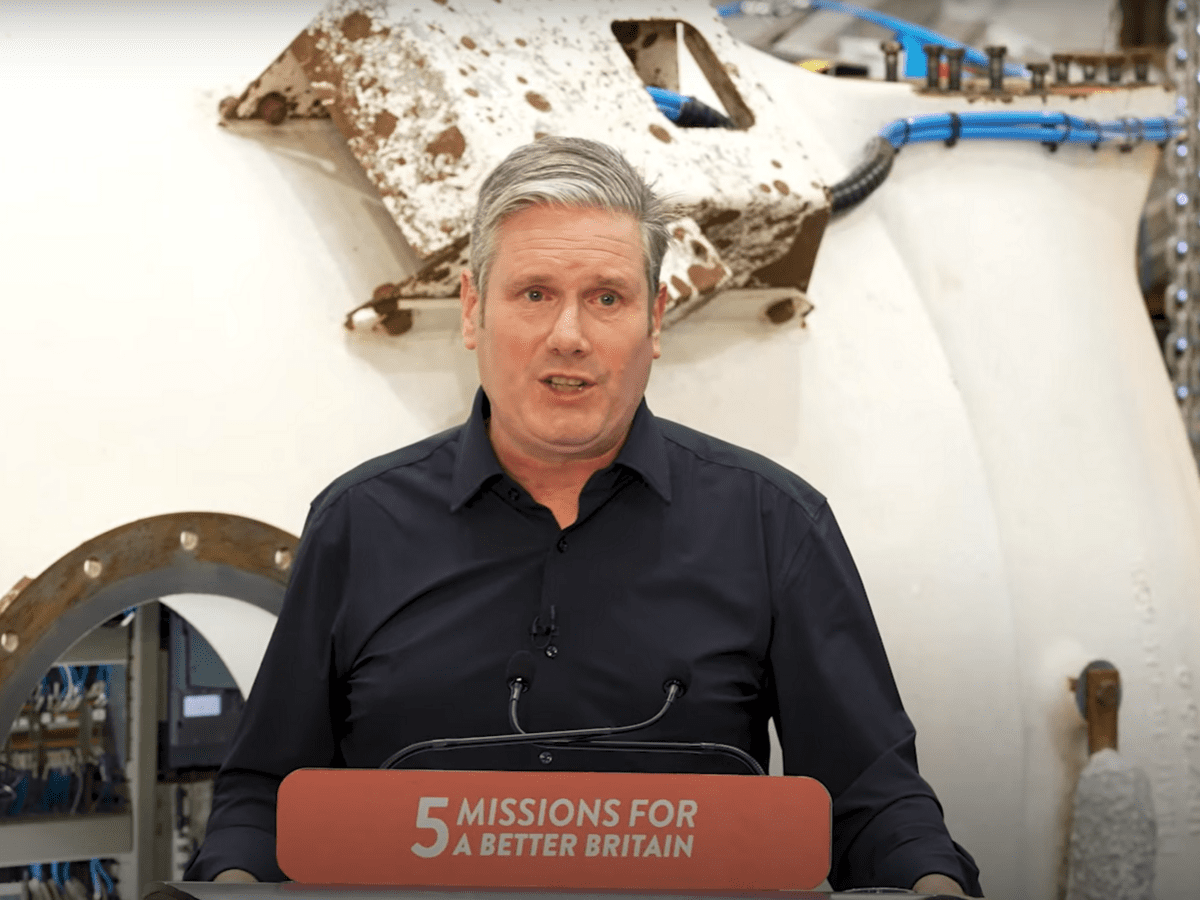The Canary can exclusively reveal that the Labour Party took tens of thousands of pounds in donations from fossil fuel-linked donors in the first week of its general election campaign.
Fossil fuel money
A new report from climate investigations outlet Desmog has revealed the damning scale of the Tories’ fossil fuel donations. In just the first week of the general election campaign, the rightwing party derived 40% of its donations – £225,000 – from donors with vested interests in fossil fuels.
However, the Tories weren’t the only ones cosying up with the polluting industry. The Canary has identified that election frontrunner and opposition the Labour Party also took sizeable funds from donors connected to the fossil fuel sector.
While less directly tied to oil and gas interests, the Labour Party garnered this financial support totalling £37,000 in just the week between 30 May and 5 June.
Specifically, it acquired the donations from the owner of a PR firm and an associate director of a Labour-linked lobby firm.
Even though proportionally and monetarily, these accounted for far less of Labour’s election funds, it underscored how the industry still holds sway over the party.
Labour Party beholden to a fossil fuel PR firm?
The first of these donations with fossil fuel ties was from Tony Langham – otherwise known as Anthony Trevor Langham – owner of Lansons Communications. Specifically, Labour secured a £25,000 donation from Langham in the first week of the election campaign.
Langham’s PR firm lists a buffet of corporate titans from sectors including finance, private healthcare, energy firms, and air travel.
Among these were multinational bank JP Morgan and asset manager BlackRock. The 2024 ‘Banking on Climate Chaos’ report identified JP Morgan as the bank most invested in fossil fuels globally. It ploughed $430.9bn into the polluting industry between 2016 and 2023.
Similarly, in a climate non-profit coalition’s ‘Investing in Climate Chaos’ report from April 2023, BlackRock was the second worst investment company for continued fossil fuel financing. The company accounted for $262bn in fossil fuel investments in 2023.
And naturally, Lansons has played a role promoting these investments. For instance, BlackRock lists Lansons Communications for BlackRock funds invested in oil and gas.
According to its latest annual report from January, BlackRock Energy and Resources Income Trust plc held its largest assets in mining giants and oil and gas majors. These included: Glencore, BHP, Vale, Rio Tinto, Shell, ExxonMobil, RWE, and Total. Notably, Blackrock invested nearly two-thirds of the portfolio in mining and fossil fuels. This amounted to over £53m in fossil fuels, and £77m in mining.
Another fund – BlackRock Smaller Companies Trust plc – harbours nearly 5% of its investments in oil and gas resources. Both of these have Lansons as their main contact.
Besides being in bed with fossil fuels through the finance sector, Lansons also lobbies for North Sea industry body Offshore Energies UK (OEUK). OEUK represents a membership teeming in fossil fuel companies and contractors. Naturally, this includes oil majors such as BP, Chevron, Exxonmobil, and Equinor.
As well as this, Lansons is a consultant PR specialist for London Luton Airport. The airport has been seeking permission to expand its passenger capacity from 18 million to 32 million per annum.
Labour’s love affair with lobbyists
Labour also attracted a further £12,000 donation from former Labour MP, and the party’s current candidate for Redcar, Anna Turley.
In 2022, Turley became an associate director for lobby firm Arden Strategies. Former Scottish Labour leader Jim Murphy set up the agency. It has a dedicated ‘Labour directorate’ and its specific remit is to help clients “interact with Labour politicians”.
Notably, on its website, it advertises its services helping corporations map to “political stakeholders that share your company’s interests”. In particular, it states how Arden supports:
UK based and global corporate clients with unrivalled insights into Labour policies, priorities, and personalities. We also combine our proven expertise in corporate advisory work with our team’s combined understanding of how Labour operates and thinks.
While Arden does not list its clients, according to Tribune Magazine it has organised events with British Gas owner Centrica. The multinational energy company holds a stake in oil and gas corporation Spirit Energy, which boasts assets in the North Sea.
In February, Arden was the official partner of a secretive lobbying event Scottish Labour hosted alongside its main party conference.
As Open Democracy reported, the national party banned press from the this. Despite this, the independent outlet identified that Centrica’s CEO Chris O’Shea, and Scottish Renewables chief executive Claire Mack appeared on a panel discussion at the event. The pair sat on this alongside UK Labour and Scottish Labour’s net zero chiefs Ed Milliband and Sarah Boyack.
Despite the fact Scottish Renewables focuses on green technologies, the company has counted oil majors like Shell and Equinor on its board.
In addition, German firm RWE also attended the lobbying affair. While the company’s main focus is on renewables in the UK, in Europe, it operates polluting coal-fired power plants. It also owns one of Scotland’s most polluting industrial sites – Markinch biomass plant. As well as this, it operates Pembrokeshire gas power plant – the UK’s second largest greenhouse gas polluter.
Dividing line blurred by big business rhetoric
Of course, that fossil fuel-linked donations have contributed to both parties during this election campaign is significant. This is because the parties have made this out as a major point of divergence between them.
In one corner, the Conservatives have openly thrown their lot in with increasing UK fossil fuel production. Under Sunak, the party has massively moved away from holding up even the pretence of taking climate action. If “drill baby, drill” is the political slogan of the Tories’ notorious rightwing counterpart across the Atlantic, Sunak’s motto has been to “max out” the UK’s oil and gas credit card.
In just the last year, the Tories have ditched multiple green targets, while ramping up its domestic “energy security” rhetoric. Invariably, it has primarily turned this to upscaling new North Sea oil and gas projects and introducing new climate-wrecking legislation. In 2022 it licensed a new coal mine in Cumbria. Then, following this, in September 2023 it greenlit the gargantuan Rosebank oil and gas field. Campaigners have estimated that it alone will generate greenhouse gas emissions equivalent to the 28 lowest-income countries across its lifetime.
Needless to say, fossil fuel-vested donors’ capture of the Tories via donations in the election is none too surprising.
Conversely, Labour has promised to end new fossil fuel licences and accelerate the shift to renewables.
Despite this, as the Canary has previously unpacked, Labour’s supposed ‘just transition’ and climate ambition is predicated on the ‘net zero’ capitalist con. Exemplifying this, at its conference in 2023:
Labour boasted how it is “on the side of the British people”. However, the climate-wrecking corporate bodies flooding the Labour fringe events told a different story.
In particular, the Carbon Capture and Storage Association schmoozed with politicians at this conference.
The first is a lobbying industry body for exactly what it says on the tin: carbon capture and storage technology (CCS). As we’ve highlighted before, CCS is a so-called ‘climate solution’ that the fossil fuel industry overwhelmingly favours. Largely, this is because the technology provides a lifeline for its destructive business-as-usual. Unsurprisingly then, big oil and gas bigwigs have packed out the association as members.
Next to the association, Offshore Energies UK (OEUK) once again cropped up there too. OEUK hosted a panel discussion alongside Labour’s then shadow decarbonisation minister Sarah Jones.
Then of course, there’s Labour’s flagship green power plan Great British Energy. Notably, contrary to its initial boasts, Great British Energy is not a nationalised energy company at all. For all Labour’s bluster on this, it’s ostensibly a vehicle for funnelling public profit into private pockets.
On top of this, the Canary’s James Wright eviscerated the party’s green financing proposals for the project:
Labour has said it will provide a starter injection of £8.3bn for the company, which isn’t much compared to its previous pledge of £28bn per year.
In other words, it’s less than a third of the pledged investment that Labour unceremoniously ditched in one of its now-infamous U-turns.
So, as I previously concluded:
the positive news is, Labour is genuinely proposing to ramp up renewables and the UK’s green energy capacity. However, tempering any enthusiasm, it plans to do this the bad old fashioned way: that is, through unfettered capitalism – just green this time.
North Sea oil and gas “for decades to come”
To make matters worse, there’s still a gaping hole in Labour’s climate pledges. While the Tories and its corporate media cronies have attempted to brand the party “the political wing of Just Stop Oil”, in reality, this couldn’t be further from the truth.
Partly, they have made these accusations owing to another of Labour’s major donors. Ecotricity founder and former donor of Just Stop Oil Dale Vince has thrown his support behind Starmer’s party. According to the Financial Times, Vince gave the party £1m the day after Sunak announced the general election. Of course, this was not accounted for in the Electoral Commission’s data, since it covered the period between 30 May to 5 June.
However, if Vince and his JSO leanings have the ears of Labour heavyweights, it has only gone so far. Notably, the party has staunchly refuted calls to phase-out the UK’s existing oil and gas fields.
Instead, Labour has flirted with favourite industry framings of the inevitability of the UK’s fossil fuel-powered future. Predictably, OEUK’s prevailing position is that:
the UK will continue to need oil and gas
And you could almost play an extremely bland game of spot the difference with the Labour Party’s manifesto. It says that:
oil and gas production in the North Sea will be with us for decades to come
In other words, Labour’s election manifesto is peddling this very same rhetoric. If that wasn’t suspiciously uncanny enough, Arden’s Murphy is on the board for the Future Energy Skills Programme coordinated by Centrica and GMB. Arden’s webpage on the programme states that it:
has been created to examine how the UK energy sector can lead this impetus for change and build upon the work of UK Government’s Green Jobs Taskforce. It brings together leaders from business, trade unions and academia together representing more than 6 million workers across Scotland, England and Wales.
What’s more, it listed a who’s who of polluting industries among its board members, including:
Equinor, Rolls-Royce, National Grid, Daikin, the TUC, University of Strathclyde Centre for Energy Policy, Arden Strategies, Offshore Energies UK, JCB, Prospect, Unison and Unite.
In the programme’s report, it pushed the all-too familiar line that the UK will:
continue to rely on oil and natural gas
Not to mention of course that the report also promotes fossil fuel company-favoured climate ‘solutions’ like hydrogen and CCS.
Labour’s ‘balancing act’ or a goon for big oil and gas?
Overall, as Politico reported in January, the party has made no secret of its plans get big oil and gas on side. The media site noted that Labour is caught between:
promoting a highly ambitious, very expensive Green Prosperity Plan to wean the country off reliance on oil and gas, while also trying to persuade deep sea drillers that the transition will not hit jobs or investment in their industry.
Yet, it’s not just the industry it’s treading a fine balancing act over. Labour has also drawn the ire of GMB and Unite with its plans to halt new oil and gas licences.
Partly, this has revolved around alarm that Labour will not implement a ‘just’ transition. Given that the party is steeped in bolstering opportunities for big oil business titans, the unions’ concerns might well be warranted. When it comes down to it, corporate executives have shown time and again that they’ll readily sacrifice workers on the altar of money-saving and maintaining profit yields. Unfortunately, little in Labour’s plans suggest it will protect workers from this.
The Canary contacted Anna Turley, Tony Langham, and the Labour Party for comment, but none had responded to our request by the time of publication over their donations.
At the end of the day, it’s that old wearying “lesser of two evils” adage in action. Labour is the cleaner, greener choice on the ballot – up against the Tories’ abysmal anti-climate policies. However, it too appears quite ready to dirty its hands for donations.
If you’re looking for a party with no fear, no favour when it comes to fossil fuels – Labour is a far-cry from your climate justice champion at this election.
Feature image via the Labour Party – Youtube




